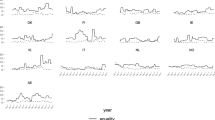Abstract
This article constructs a rational choice model of the intergenerational transmission of party identification. At a given time, identification with a party is the estimate of average future benefits from candidates of that party. Experienced voters constantly update this expectation using political events since the last realignment to predict the future in accordance with Bayes Rule. New voters, however, have no experience of their own. In Bayesian terms, they need prior beliefs. It turns out that under certain specified conditions, these young voters should rationally choose to employ parental experience to help orient themselves to politics. The resulting model predicts several well–known features of political socialization, including the strong correlation between parents' and children's partisanship, the greater partisan independence of young voters, and the tendency of partisan alignments to decay.
Similar content being viewed by others
REFERENCES
Achen, Christopher H. (1992). Social psychology, demographic variables, and linear regression: breaking the iron triangle in voting research. Political Behavior 14, 3 (September): 195–211.
Bartels, Larry M. (1993). Messages received. American Political Science Review 41, 2 (April): 641–674.
Bartels, Larry M. (2001a). A generational model of political learning. Presented at the annual meeting of the American Political Science Association, San Francisco, September.
Bartels, Larry M. (2001b). Beyond the running tally. Presented at the Parties and Partisanship Conference, Vanderbilt University, October 25-27.
Campbell, Angus, Converse, Philip E., Miller, Warren E., and Stokes, Donald E. (1980). The American Voter (Midway Reprint). Chicago: University of Chicago Press. (Original work published 1960)
Converse, Philip E. (1964). The nature of belief systems in mass publics. In David E. Apter (ed.), Ideology and Discontent. Glencoe, IL: Free Press.
Converse, Philip E. (1969). Of time and partisan stability. Comparative Political Studies 2: 139–71.
Converse, Philip E., and Pierce, Roy (1985). Measuring partisanship. Political Methodology 11, 3-4: 143–166.
Converse, Philip E., and Pierce, Roy (1986). Political Representation in France. Cambridge, MA: Harvard University Press.
Downs, Anthony (1957). An Economic Theory of Democracy. New York: Harper and Row.
Easton, David, and Dennis, Jack (1969). Children in the Political System. New York: McGraw-Hill.
Fiorina, Morris (1981). Retrospective Voting in American Elections. New Haven: Yale University Press.
Flanigan, William H., Rahn, Wendy M., and Zingale, Nancy (1989). Political parties as objects of identification and orientation. Presented at the Western Political Science annual meeting, Salt Lake City, March.
Franklin, Charles H. (1984). Issue preferences, socialization, and the evolution of party identification.” American Journal of Political Science 28, 3 (August): 459–478.
Franklin, Charles H., and Jackson, John E. (1983). The dynamics of party identification. American Political Science Review 77: 957–973.
Gerber, Alan, and Green, Donald P. (1998). Rational learning and partisan attitudes. American Journal of Political Science 42, 3 (July): 794–818.
Green, Donald P., Palmquist, Bradley, and Schickler, Eric (2002). Partisan Hearts and Minds. New Haven: Yale University Press.
Greenstein, Fred I. (1969). Children and Politics (revised edition). New Haven: Yale University Press.
Hess, Robert D., and Torney, Judith V. (1968). The Development of Political Attitudes in Children. Garden City, NY: Anchor.
Jackson, John E. (1975a). Issues, party choices and presidential votes. American Journal of Political Science 19: 161–185.
Jackson, John E. (1975b). Issues and party alignment. In Louis Maisel and Paul M. Sacks (eds.), The Future of Political Parties pp. 101–123. Beverly Hills: Sage.
Jennings, M. Kent, and Niemi, Richard G. (1981). Generations and Politics. Princeton: Princeton University Press.
Johnston, Richard (1988). Paper presented at the 1988 meeting of the American Political Science Association.
Kershaw, Ian (1983). Popular Opinion and Political Dissent in the Third Reich. Oxford: Oxford University Press.
Key, V. O. (1959). Secular realignment and the party system. Journal of Politics 21: 198–210.
Key, V. O. (1966). The Responsible Electorate. New York: Vintage.
Kramer, Gerald (1988). Political science as science.” In Herb Weisberg, ed. Political Science: The Science of Politics pp. 11–23. New York: Agathon.
Miller, Warren E., and Shanks, J. Merrill (1996). The New American Voter. Cambridge, MA: Harvard University Press.
Sears, David O. (1975). Political Socialization. In Fred I. Greenstein and Nelson W. Polsby, eds., Handbook of Political Science (vol. 2), pp. 93–136. Reading, MA: Addison-Wesley.
Shively, W. Phillips (1980). The nature of party identification: a review of recent developments. In John C. Pierce and John L. Sullivan (eds.), The Electorate Reconsidered pp. 219–236. Beverly Hills: Sage.
Trevor, Margaret C. (1999). Political socialization, party identification, and the gender gap. Public Opinion Quarterly 63, 1 (Spring): 62–89.
Weisberg, Herbert F. (1980). A multidimensional conceptualization of party identification. Political Behavior 2: 33–60.
Zechman, Martin J. (1979). Dynamic models of the voter's decision calculus. Public Choice 34, 3-4: 297–315.
Author information
Authors and Affiliations
Rights and permissions
About this article
Cite this article
Achen, C.H. Parental Socialization and Rational Party Identification. Political Behavior 24, 151–170 (2002). https://doi.org/10.1023/A:1021278208671
Issue Date:
DOI: https://doi.org/10.1023/A:1021278208671




